10 Most Sustainable Hemp Clothing Brands: The Conscious Consumer’s Guide
Impactful Ninja is reader-supported. When you buy through links on our site, we may earn an affiliate commission.
Learn more
Learn more
.
Hey fellow impactful ninja ? You may have noticed that Impactful Ninja is all about providing helpful information to make a positive impact on the world and society. And that we love to link back to where we found all the information for each of our posts. Most of these links are informational-based for you to check out their primary sources with one click. But some of these links are so-called "affiliate links" to products that we recommend. First and foremost, because we believe that they add value to you. For example, when we wrote a post about the environmental impact of long showers, we came across an EPA recommendation to use WaterSense showerheads. So we linked to where you can find them. Or, for many of our posts, we also link to our favorite books on that topic so that you can get a much more holistic overview than one single blog post could provide. And when there is an affiliate program for these products, we sign up for it. For example, as Amazon Associates, we earn from qualifying purchases. First, and most importantly, we still only recommend products that we believe add value for you. When you buy something through one of our affiliate links, we may earn a small commission - but at no additional costs to you. And when you buy something through a link that is not an affiliate link, we won’t receive any commission but we’ll still be happy to have helped you. When we find products that we believe add value to you and the seller has an affiliate program, we sign up for it. When you buy something through one of our affiliate links, we may earn a small commission (at no extra costs to you). And at this point in time, all money is reinvested in sharing the most helpful content with you. This includes all operating costs for running this site and the content creation itself. You may have noticed by the way Impactful Ninja is operated that money is not the driving factor behind it. It is a passion project of mine and I love to share helpful information with you to make a positive impact on the world and society. However, it's a project in that I invest a lot of time and also quite some money. Eventually, my dream is to one day turn this passion project into my full-time job and provide even more helpful information. But that's still a long time to go. Stay impactful,Affiliate Disclosure
Why do we add these product links?
What do these affiliate links mean for you?
What do these affiliate links mean for us?
What does this mean for me personally?
![]()
Amid growing concerns about the textile industry’s environmental impact, there is pressure to find greener clothes for your wardrobe. Hemp clothes are a great option because hemp is a natural fiber from a low-input crop that has significant environmental benefits. Unfortunately, fashion greenwashing makes it harder for you and all other consumers to figure out which hemp clothing brands offer the most eco-friendly clothes. So, we had to ask: Which are the most sustainable hemp clothing brands?
The most sustainable hemp clothing brands include Patagonia, Tentree, and Eileen Fisher, which use low-impact materials, employ full traceability, and strive for textile circularity. In addition, NATASHA TONIC and Outerknown commit to reducing carbon footprints and plastic pollution.
Whether you search for a knitwear garment, a casual top, or some outdoor gear to add to your wardrobe without negatively impacting the soil, the water, the animals, and other people, there is a brand for you. So, let’s keep reading to learn more about the most sustainable hemp clothing brands and how they ensure sustainable, ethical practices.
Here’s How Sustainable Hemp Fabrics Generally Are
Hemp fabrics are typically made with natural fibers from industrial hemp plants, a high-yield fiber crop with low input requirements. The industrial hemp crops sequester carbon and promote biodiversity.
“Sustainable: The ability to be maintained at a certain rate or level | Avoidance of the depletion of natural resources in order to maintain an ecological balance”
Oxford Dictionary
To understand the sustainability of hemp, we’ve assessed the life-cycle and each stage’s sustainability. This life-cycle assessment (LCA) is a method to evaluate the environmental impacts of products and materials. Here’s a quick summary of our LCA of hemp!
What makes it so sustainable: Hemp fabrics are durable and biodegradable materials made with fibers from industrial hemp plants, often grown and processed without toxic synthetic chemicals. Hemp plants are considered the most productive fiber-producing crops.
Additionally: The industrial hemp crop requires little irrigation and thrives in a wide range of environments.
Here’s How We Selected the Most Sustainable Hemp Clothing Brands
The brands on this list were chosen based on their commitment and actions to promote sustainable practices while reducing the environmental impacts of the textile industry.
They are transparent about their materials, processes, and workforce management within their supply chain.
Some brands focus their efforts on reducing waste and optimizing natural resources while others strive to reduce the carbon footprint of their clothes.
All of these brands share the commitment to reshape the textile industry toward a more sustainable and Earth-friendly sector.
These Are the 10 Most Sustainable Hemp Clothing Brands
Most Sustainable Hemp Clothing Brands
Overall, these linen clothing brands are sustainable. Yet, they take various approaches to reduce environmental impacts and uphold ethical standards. Let’s dive into each brand and find out more.
Patagonia: Everyday Wear for Those Who Care
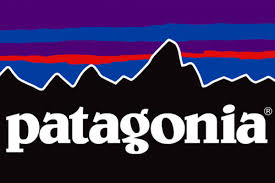
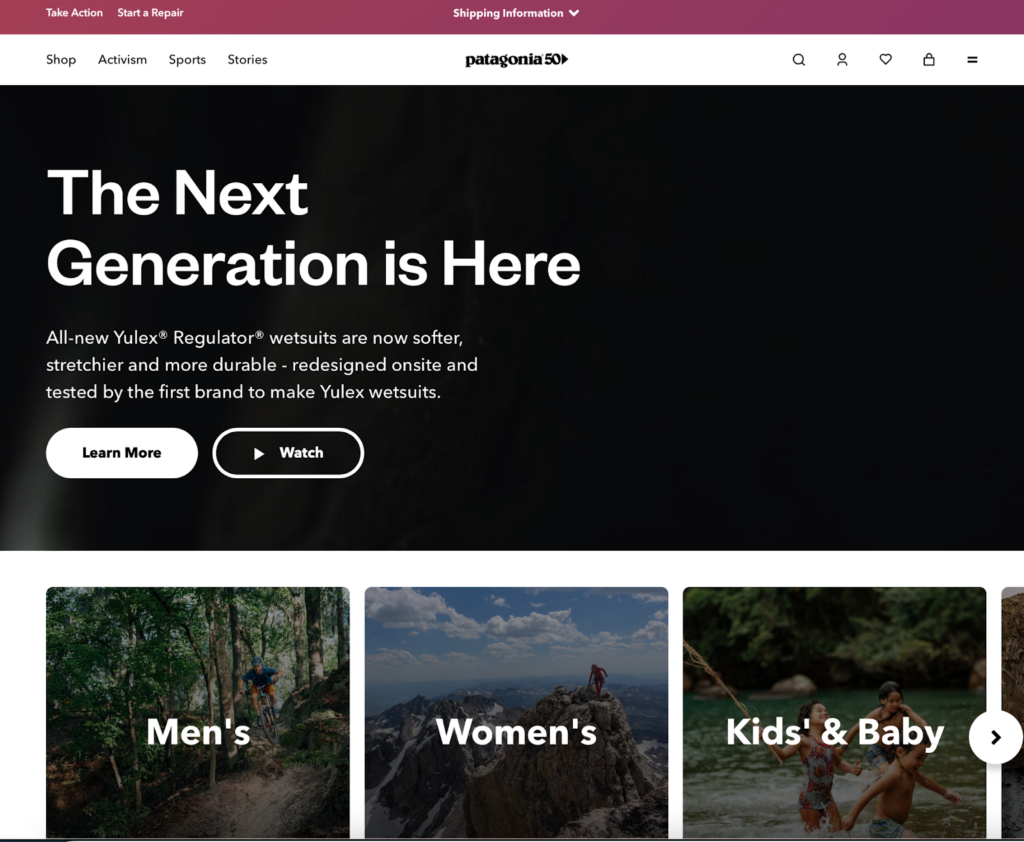
“Together, we can prioritize purpose over profit and protect this wondrous planet, our only home.”
Patagonia
🌎
How do they ensure their sustainability?
Patagonia puts sustainability at the center of their operation. They work to reduce, rather than simply offset, carbon emissions where it matters the most: in the supply chain and material manufacturing. They reduce their carbon footprint by removing high-impact virgin fossil-based fibers from their collections, using “Environmental Profit and Loss” to guide their production decision, and helping their suppliers to cut emissions. Patagonia’s fall 2023 collections are made up mostly of preferred materials (91% by fabric weight), such as organic cotton, hemp, and various recycled fabrics. On top of that, Patagonia’s Worn Wear Program encourages customers to repair and recycle their products, extending the textile lifecycle and reducing waste. Lastly, Patagonia is certified as a B Corporation and a Bluesign brand.
🌐
How do they ensure their ethics?
Patagonia commits to fair trade practices. Through the partnership with Fair Trade USA, they currently produce 86% of their clothes in 20 Fair Trade Certified factories. Patagonia pays a premium for every item produced in such factories, accumulating in a fund for workers to use in their chosen community projects, whether in healthcare or parent support or to withdraw as a cash bonus. Additionally, they have various social responsibility programs to prevent harm and create positive impacts on the lives of apparel workers in their supply chain. These include the Fair Labor Association, the Living Wage Program, the Migrant Workers Program, and the Responsible Purchasing Practices. Patagonia is fully transparent about the locations of their facilities and suppliers.
🤝
Are they part of any giving-back programs?
Since 1985, Patagonia has pledged 1% of sales annually to environmental causes. They have awarded over $89 million in cash and kind donations to domestic and international grassroots environmental groups, making a difference in their local communities. In 2022, the founder of Patagonia gave away his family’s ownership of the company to the newly created Patagonia Purpose Trust and the not-for-profit organization Holdfast Collective, ensuring that all future profits from the company are used to fight the climate and extinction crisis.
🛍️
What is their product range?
- Best for: kidswear, menswear, womenswear
- Product range: shirts, pants, jackets, blazers, hoodies, sweatshirts, T-shirts, shorts, plus-size
- Price range: $$$
- Size range: XXS–XXXL
Tentree: A Lifestyle Clothing Brand That Plants Trees for Every Item Purchased

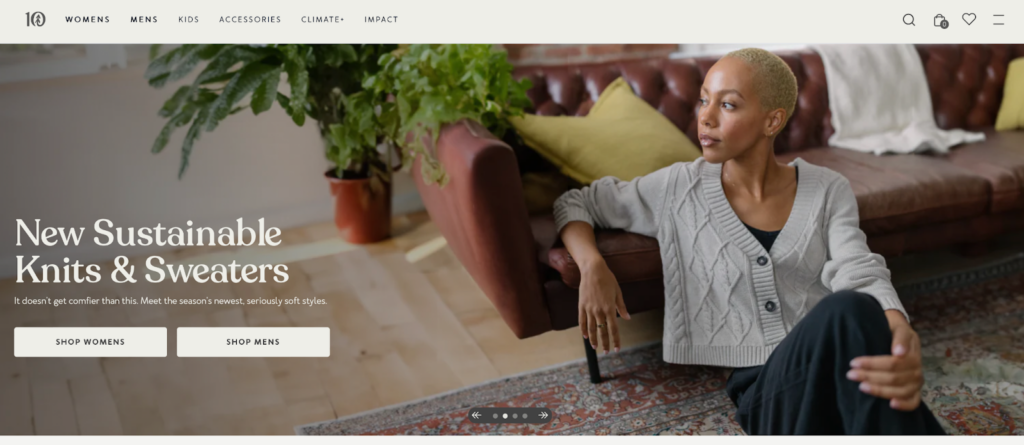
“ We believe the future of business is restorative.”
Tentree
🌎
How do they ensure their sustainability?
Tentree ensures sustainability by planting trees, promoting circularity, opting for low-impact fabrics, and attaining responsible packaging. Since their inception, they have planted more than 100,000,000 trees, which helps regenerate ecosystems, capture carbon, and provide forestry jobs in communities around the world. Together with textile recycler SuperCircle and resale guru Treet, Tentree has created an integrated solution to resell or recycle preloved Tentree clothing items, keeping them in circulation and out of landfills. Tentree also uses eco-friendly fabrics and blends, including organic cotton, hemp, recycled polyester, and TENCEL™. Regarding packaging, they replaced all single-use plastics with FSC-certified and 100% recycled paper. They have B Corporation and Climate Neutral certifications.
🌐
How do they ensure their ethics?
Tentree enforces fair labor practices by collaborating only with manufacturers and suppliers that guarantee a safe and respectful environment for their employees. They regularly audit their partner facilities to ensure compliance with their Code of Conduct and international labor standards. Part of their supply chains is certified by organizations that protect workers, such as Fair Wear Foundation, Global Organic Textile Standard, Sedex Members Ethical Trade Audit, and Worldwide Responsible Accredited Production – WRAP. Additionally, Tentree commits to protecting forests through their paper, packaging, and fabric choices.
🤝
Are they part of any giving-back programs?
Giving back is a cornerstone of Tentree’s mission. Tentree plants 10 trees worldwide for every item purchased, contributing to reforestation and combating climate change. In 2022 alone, their customers helped plant over 22 million trees across nine countries, restoring over 2,000 hectares of terrestrial forests, over 1,000 hectares of coastal mangrove forests, and hundreds of hectares of marine land.
🛍️
What is their product range?
- Best for: kidswear, menswear, womenswear
- Product range: T-shirts, tank tops, shirts, sweaters, cardigans, dresses, pants, hoodies, sweatshirts, dresses, shorts, skirts, joggers, jackets, coats, underwear
- Price range: $$
- Size range: XXS–XXL
Eileen Fisher: A Sustainable Fashion Brand Focusing on Eco-Friendly Materials and Textile Circularity
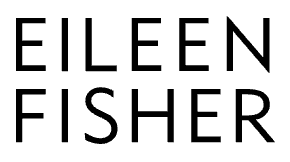
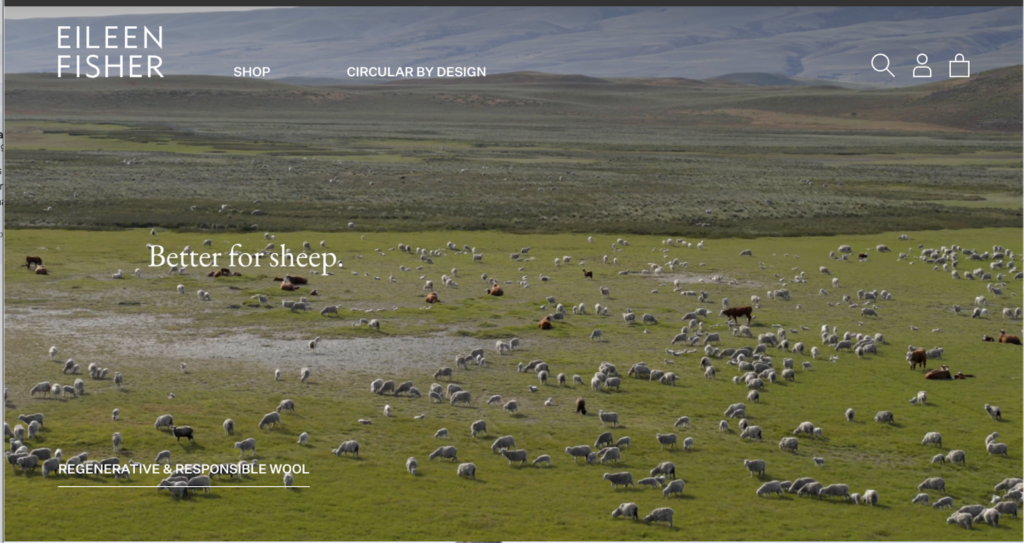
“The Biggest Thing We Can Do Is Reduce”
Eileen Fisher, founder of Eileen Fisher
🌎
How do they ensure their sustainability?
Eileen Fisher’s sustainability efforts focus on using eco-friendly materials, including organic cotton, linen, and hemp, reducing greenhouse gas emissions generated from their operations and supply chain, reducing fabric and corporate waste, and recycling the brand’s used clothes back into new products. Their commitments to sustainable materials, circular systems, and environmentally friendly practices are demonstrated in initiatives like VISION 2020, Horizon 2030, and Renew. They are certified as a B Corporation and a Bluesign brand.
🌐
How do they ensure their ethics?
Eileen Fisher is committed to ethical practices. They have worker empowerment initiatives such as collective bargaining and the right to make a complaint. For example, their “Our Love, Peru” project supports over 450 families in and around Arequipa with higher fair trade wages and investments in the local community. Additionally, Their VISION 2020, set in 2015, tackled unethical labor practices.
🤝
Are they part of any giving-back programs?
Eileen Fisher supports many women-owned businesses. The brand has provided, since its inception, many grants for women, including the current program Supporting Women in Environmental Justice.
🛍️
What is their product range?
- Best for: elegant, classic, and casual women’s clothes
- Product range: dresses, blouses, sweaters, cardigans, pants, skirts and outerwear, shoes, accessories
- Price range: $$$
- Size range: XXS–3XL
NATASHA TONIC: Making Plant-Based Swimwear to Reduce Microplastic Pollution
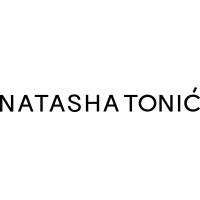
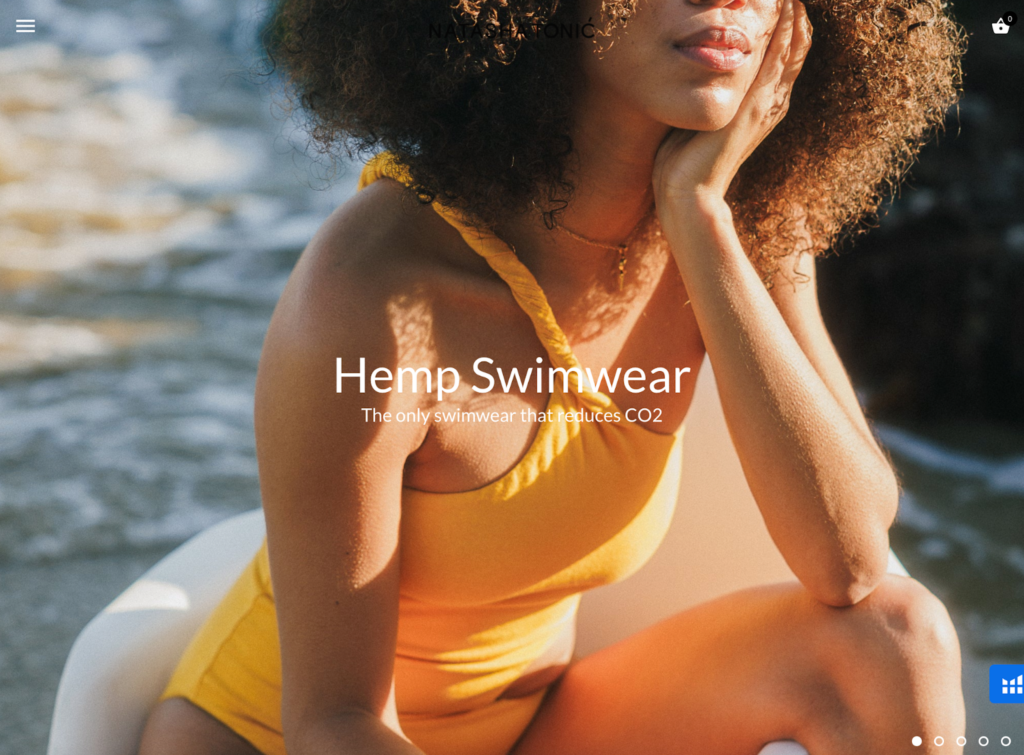
“We make everything locally in small batches to make sure we don’t have a negative impact on the environment.”
NATASHA TONIC
🌎
How do they ensure their sustainability?
NATASHA TONIC prioritizes sustainability through eco-friendly materials, low-impact processes, and low-footprint practices. They use a high proportion of sustainable natural fabrics, including hemp and certified organic cotton, and only low-impact, non-toxic dyes that contain soluble natural components and no heavy metals. NATASHA TONIC lowers the manufacturing impact by applying on-site heat reclamation, on-site water filtration, and no-salt-added dye baths in their dyeing processes and using biopolishing in their finishing treatments. Additionally, they reduce their transporting carbon footprint by purchasing fabrics locally in the US and using electric vehicles for delivering between suppliers and studios.
🌐
How do they ensure their ethics?
NATASHA TONIC puts protecting workers and nature at the core of their operations. As such, they trace most of their supply chain, including all of the final and second stages of production. Their second stage of production is audited by the Fair Wear Foundation. Workers at their US factory are all paid according to California standards. NATASHA TONIC protects nature by eliminating contaminants in surface runoff to maintain the surface and groundwater quality and replacing insecticides with natural pest-controlling methods.
🤝
Are they part of any giving-back programs?
NATASHA TONIC donates 5% of every swimsuit sold to 5 Gyres to support fighting plastic and microfibre pollution. Additionally, they contribute to the cause of social movements, including Tree People, Black Lives Matter, and Downtown Women’s Center.
🛍️
What is their product range?
- Best for: womenswear
- Product range: swimwear, tops, blouses, bodysuits, lingerie
- Price range: $$$
- Size range: XS–XL
Outerknown: Stylish Clothes Made Sustainably and Ethically

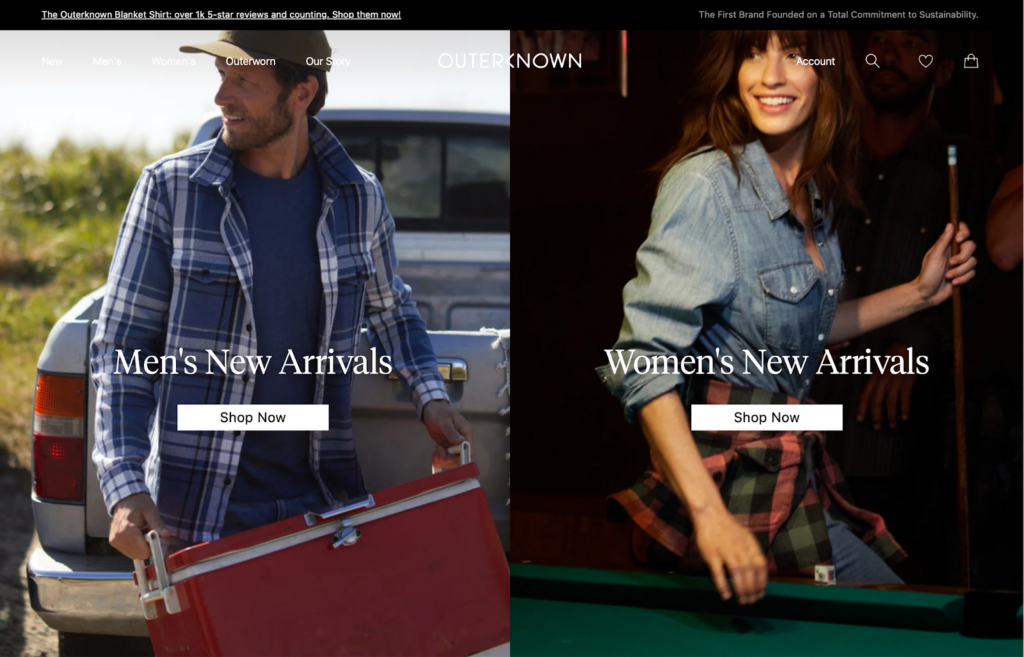
“We are driven by a passion for responsible action, courageous change, and great clothes.”
Outerknown
🌎
How do they ensure their sustainability?
Outerknown places sustainability at its core by using eco-friendly materials such as hemp, organic cotton, recycled cotton, and responsible wool in their clothing, reducing the environmental impact. In 2022, these preferred fibers accounted for 95% of their collection. The brand’s Outerworn platform offers customers a chance to buy and sell pre-loved pieces, contributing to closing the loop in fashion. They also partner with Project Vermont to give new purpose to materials that would otherwise end up in landfills. Additionally, Outerknown strives to reduce their footprint by working with two B Corp Certified suppliers and having 8 facilities running on renewable energy.
🌐
How do they ensure their ethics?
Outerknown maintains ethics by promoting the highest labor standards in alignment with the Fair Labor Association. They publicly share their Code of Conduct, which covers all of the ILO Four Fundamental Freedoms principles. Outerknown provides Fairtrade Premium, which has improved workers’ livelihoods in their supply chain via workers’ chosen programs in healthcare, education, accommodation, and financial independence.
🤝
Are they part of any giving-back programs?
Outerknown gives back to non-profits that align with their values and help make a larger impact. They work with organizations like Brother Benno, The Ocean Cleanup, Ocean Conservancy, Surfrider Maui Chapter, Surfrider Foundation, and Everytown.
🛍️
What is their product range?
- Best for: menswear, womenswear
- Product range: shirts, pants, T-shirts, tops, sweaters, dresses, hoodies, shorts, denim, jackets, blazers, jumpsuits, playsuits, swimwear
- Price range: $$$
- Size range: XS–XL
Toad&Co: Made-to-Order Clothes Using Highly Sustainable Materials
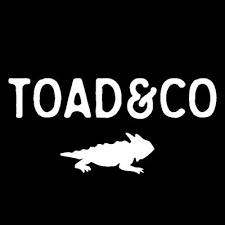
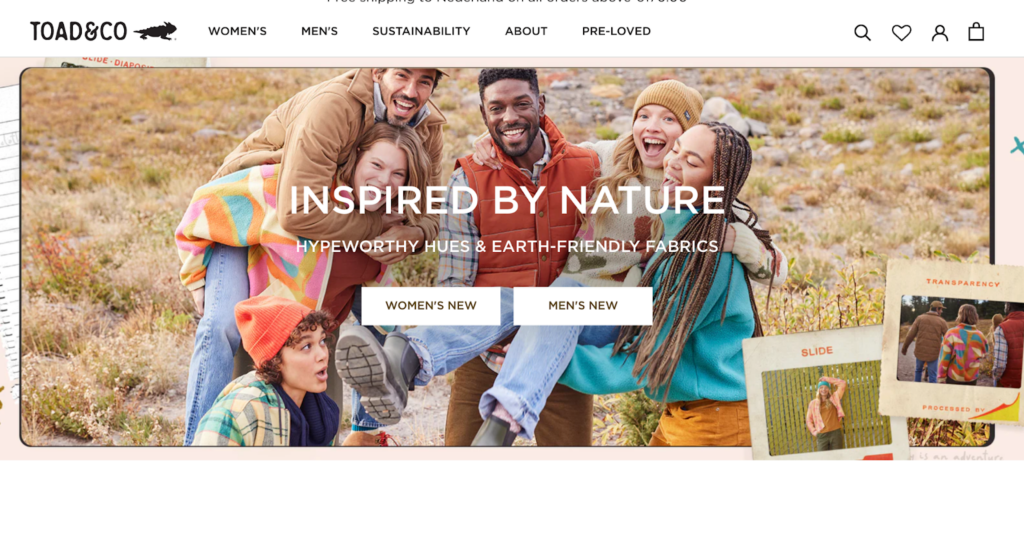
“Our commitment to a cleaner way of living and doing business has made us stronger and, like any good relationship, we take every day as it comes.”
Toad&Co
🌎
How do they ensure their sustainability?
Toad&Co promotes sustainability by sourcing eco-friendly materials, reducing carbon footprints, supporting textile circularity, and joining the responsible packaging movement. 100% of Toad&Co clothing is made with a minimum of 80% sustainable fibers and/or fabrics that have met Earth-friendly standards in accordance with Bluesign or Standard 100 by OEKO-TEX®. They use organic cotton, recycled fabrics, hemp, and TENCEL™. Furthermore, they purchase Renewable Energy Certificates (RECs) for all Toad&Co locations to offset their energy use by supporting the development of emission-free renewable energy and carbon reduction projects. The ToadAgain platform enables reselling and buying pre-loved items to reduce waste and extend the lifespan of clothing items. Additionally, Toad&Co provides resources for consumers to mend and extend the usage of their clothes.
🌐
How do they ensure their ethics?
Toad&Co is committed to promoting fair labor practices and safe working conditions in all factories in their supply chain. Their manufacturers are held to Toad&Co’s Workplace Code of Conduct to provide employees with a sustainable work environment. Their Code of Conduct follows the ILO Four Fundamental Freedoms principles. They also visit vendors’ facilities on a yearly basis to ensure that their clothes are produced with integrity. In 2010, Toad&Co was named one of Outside Magazine’s best places to work.
🤝
Are they part of any giving-back programs?
At the very beginning of their journey, Toad&Co co-founded Planet Access Company, which employs adults with disabilities, fostering inclusivity and diversity in the workforce. Additionally, they run programs that support people with disabilities to make arts and enjoy outdoor adventures. They also give 1% of all sales to environmental causes via 1% for the Planet membership. In the last 20 years, they have helped to fund 120 environmental protection organizations.
🛍️
What is their product range?
- Best for: menswear, womenswear
- Product range: shirts, sweaters, dresses, pants, maternity clothing, T-shirts, shorts, underwear
- Price range: $$
- Size range: XS–XL
WAMA: The Pioneer in Hemp Underwear
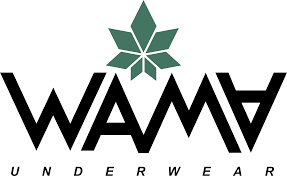
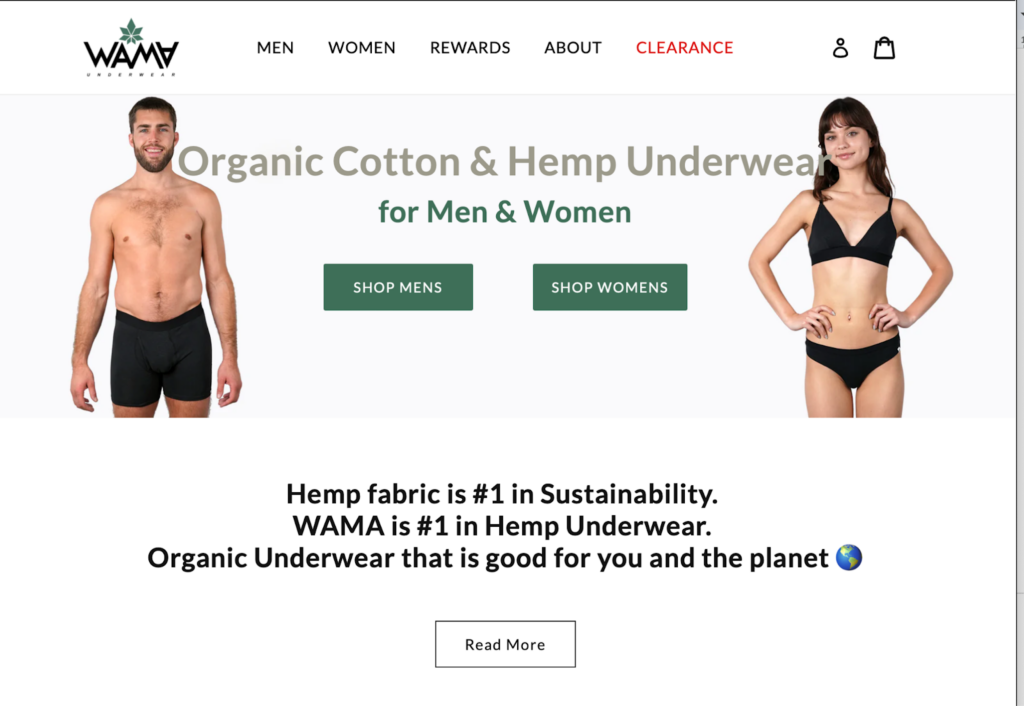
“We believe hemp is the answer to cut down on pollution and save nature.”
Shakib Nassiri, founder of WAMA
🌎
How do they ensure their sustainability?
WAMA ensures sustainability by creating low-impact fabrics based on organic hemp fibers, in consideration of the plant’s high carbon sequestration potential and low inputs. Their materials are organic and contain no excess harmful toxins. On top of that, their supply chain includes family-run organic farms, where hemp fibers are extracted using only water and dew—the most sustainable retting method—as well as an organic hemp spinner, an OEKO-TEX-certified factory where their hemp-based fabrics are finished using low-impact dyes, and factories complying with the BSCI system. WAMA undies are delivered in custom boxes made from 100% recycled materials, recycled poly mailers, and naturally biodegradable tissue paper.
🌐
How do they ensure their ethics?
WAMA ensures their ethics through full transparency about their supply chain. Their facilities are upheld by their supplier code of conduct, which covers all of the ILO Four Fundamental Freedoms principles, ensuring opportunities for safe work, economic development, and sustainable business. The factories where their products are sewn are BSCI certified, which means safe workplace standards for all employees. Finally, WAMA is a Green America Certified Business and a PETA-Approved Vegan brand.
🤝
Are they part of any giving-back programs?
WAMA is not known to be part of any giving-back programs.
🛍️
What is their product range?
- Best for: womenswear, menswear
- Product range: underwear, bralettes, plus-size
- Price range: $$
- Size range: XS–XXXL
Opera Campi: Innovative Hemp Fabrics Offset By Tree Planting
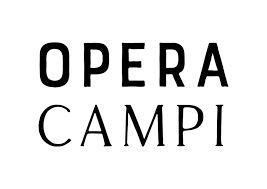
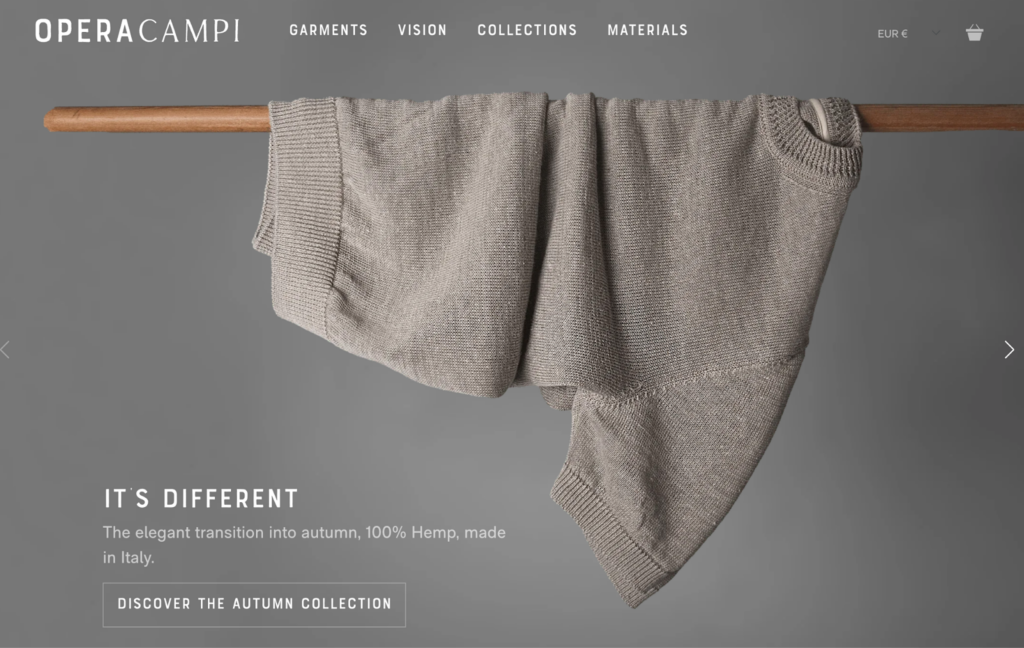
“We pioneer a radical concept of sustainability based on flexible production, new hemp-based material, minimal packaging and more.”
Opera Campi
🌎
How do they ensure their sustainability?
Opera Campi ensures their sustainability by making innovative low-impact fabrics based on hemp fibers, in consideration of the plant’s high carbon sequestration potential and low irrigation requirement. Their hemp T-shirt’s emission is less than 3kg CO₂, which is half of a common cotton T-shirt’s emission. Their Zero Sweater, an undyed hemp knitwear, is carbon-negative (cradle-to-gate). Opera Campi operates a made-to-order system, preventing fabric waste and saving water. They also use simple packaging, which is either recyclable or compostable. Additionally, Opera Campi plants two trees for every clothing item ordered, offsetting carbon emissions during the manufacturing and transporting stages.
🌐
How do they ensure their ethics?
Opera Campi engineers, designs, and produces their hemp clothing in Italy, an EU member country upholding the group standards about fair wages and safe working conditions. They trace most of their supply chain.
🤝
Are they part of any giving-back programs?
Opera Campi plants two trees for every garment ordered.
🛍️
What is their product range?
- Best for: menswear, womenswear,
- Product range: shirts, pants, jackets, blazers, knitwear, T-shirts, shorts, plus-size
- Price range: $$$
- Size range: XXS–XXXL
Beaumont Organic: Create “Contemporary Conscious Clothing” Responsibly

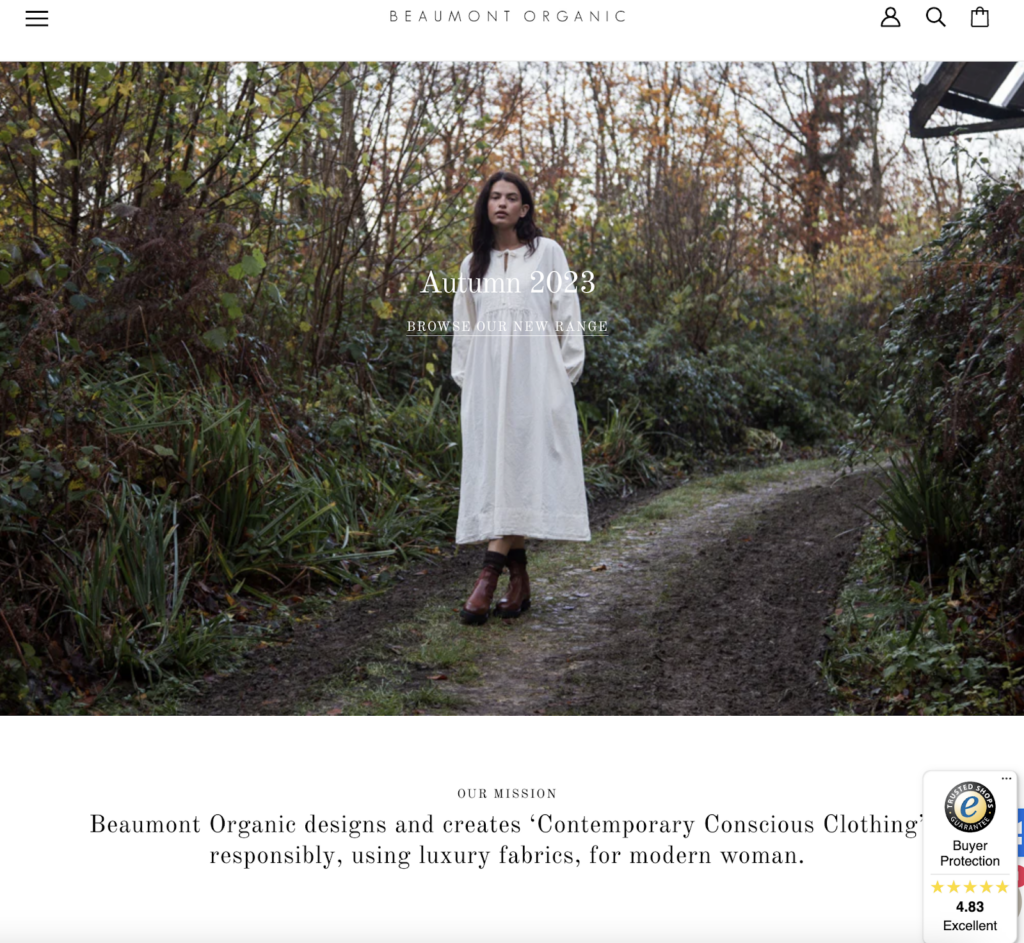
“We work hard behind the scene to provide you with full transparency into the sustainability of our practices and our suppliers”
Beaumont Organic
🌎
How do they ensure their sustainability?
Beaumont Organic prioritizes sustainability by sourcing organic and eco-friendly materials, using renewable energy in its supply chain, and reducing waste by using recycled packaging and offering clothes repairs. Additionally, they promote textile circularity with their online circular resale scheme, allowing customers to pass their pre-loved garments onto a new home. The brand features GOTS-certified organic cotton, organic hemp, TENCEL™, and recycled fabrics.
🌐
How do they ensure their ethics?
Beaumont Organic is fully transparent about the final stage of their clothes: European factories that pay fair wages and have good working conditions. Beaumont Organic uses wool accredited by the Responsible Wool Standard, guaranteeing the welfare of the animals in their supply chain.
🤝
Are they part of any giving-back programs?
The Beaumont Organic Foundation has supported various community give-back projects in Fiji, including hospital renovations.
🛍️
What is their product range?
- Best for: womenswear, babywear, homeware, accessories
- Product range: shirts, pants, jackets, blazers, knitwear, blouses, underwear
- Price range: $$$
- Size range: XS–XXL
Thought: Clothes Made With Responsibly-Sourced Materials

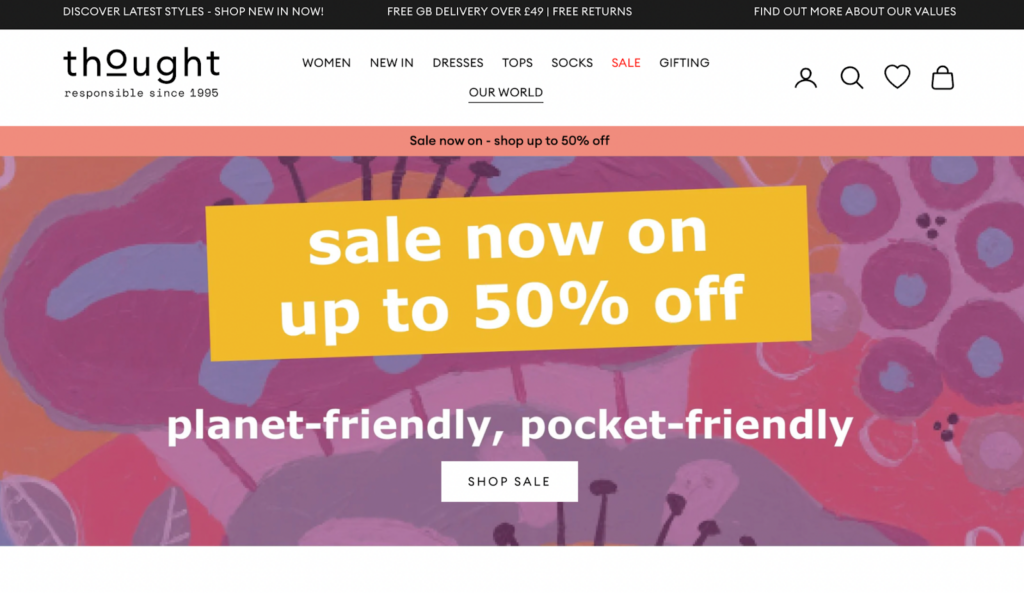
“We’ve sourced the most earth-kind fabrics we could find. So you don’t have to think about it.”
Thought
🌎
How do they ensure their sustainability?
Thought ensures sustainability by using eco-friendly materials and reducing textile waste. They use low-impact fabrics, such as organic cotton, hemp, plant-based semi-synthetic fabrics, and recycled fabrics. Instead of plastic packaging, they use FSC-certified recycled paper labels and 100% corn-based, compostable paper mailing bags. They also tackle the textile waste problem by partnering with TRAID, offering pre-loved clothing a new lease of life while promoting a circular fashion economy. Lastly, they provide resources to care for and mend clothes to extend their lifespan, lowering the carbon footprint.
🌐
How do they ensure their ethics?
Thought has a Code of Conduct that covers all of the ILO Four Fundamental Freedoms principles. More and more of their garments are GOTS and Fairtrade Certified. Their ethical commitment includes upholding animal welfare.
🤝
Are they part of any giving-back programs?
Thought is not known to be part of any giving-back programs.
🛍️
What is their product range?
- Best for: womenswear, menswear, childrenswear
- Product range: shirts, skirts, denim, sweaters, scarves, dresses, pants, jackets, blazers, knitwear, tops, blouses, T-shirts, socks, stockings, tights, shorts, underwear, sneakers, jewelry, jumpsuits, playsuits
- Price range: $$
- Size range: XS–XXL
Hemp Fabrics: Durable Natural Materials From Productive, Adaptive Plants
The industrial hemp plant has huge potential for sustainable fabrics. Indeed, the plant can easily thrive without agrochemicals, yielding a lot of fibers to make organic hemp fabrics.
Here are the life-cycle stages of organic hemp fabrics and each stage’s sustainability assessment:
- Growing of industrial hemp plants in organic farms: The hemp plants sequester a significant amount of carbon while improving soil nutrition. Little water is needed for hemp cultivation, yet the fiber yields are the highest of any natural fiber. Furthermore, organic hemp planting uses no toxic synthetic fertilizers and pesticides. This species has a wide natural range and multiple outputs (fiber, wood, oil, food, and dietary supplements).
- Manufacturing of organic hemp fabrics: Organic hemp fabric production doesn’t involve harmful synthetic chemicals. However, the mechanical processes to produce organic hemp can be labor-intensive and energy-demanding.
- Transportation of organic hemp fabrics: Organic hemp fabrics typically travel from fields (where industrial hemp plants are grown) to factories, then sorting centers, shops, and consumer’s houses before going to recycling centers or landfills. The GHG emissions associated with transporting vehicles could be significant.
- Usage of organic hemp fabrics: Organic hemp fabrics are lightweight and highly breathable. They don’t need to be washed too frequently, saving water and energy. Industrial hemp fibers are strong; in fact, they are three times the tensile strength of cotton. This means materials made with organic hemp fibers can last long before a replacement is needed, making them more sustainable.
- End-of-life of organic hemp fabrics: The end-of-life stage for organic hemp is sustainable because the fiber is biodegradable and compostable.
Hemp fabrics are one of the most sustainable textile materials. This is because they are durable and biodegradable materials made with natural fibers often without harmful synthetic chemicals. Industrial hemp plants also produce the highest fiber yield among all plant fiber crops. Lastly, these plants are adaptive and typically rainfed.
Why Is It Important to Buy Products Made of More Sustainable Fabrics
It is important to buy products made of more sustainable fabrics because a sustainable textile industry has a lower carbon footprint, helps save natural resources, and is ultimately better for forests, animals, and humans.
Buying Sustainable Fabrics Reduces Your Carbon Footprint
The production of clothing and footwear is estimated to contribute 10% of global greenhouse gas emissions—more than all international flights and shipping combined. If the fashion industry were a country, it would be the fourth largest emitter of carbon dioxide.
One way to reduce the carbon footprint of the clothes you buy is to opt for sustainable fabrics. Sustainable fabrics, which are often made with natural or recycled fibers, have relatively low carbon footprints compared to petroleum-based fabrics. For example, organic cotton made in the US has a carbon footprint of 2.35 kg CO2 (per ton of spun fiber)—a quarter of polyester’s carbon footprint.
Buying Sustainable Fabrics Reduces Demand For Natural Resources and Waste Management
The textile industry uses water and land to grow cotton and other fibers. It is estimated that 79 billion cubic meters of water were used for the sector worldwide in 2015. For example, producing a single cotton t-shirt requires as much water as one person drinks for 2.5 years (2,700 liters of fresh water).
Worse yet, the textile economy is vastly more linear than circular: the largest amount of resources used in clothes ended up in landfills (instead of being recycled to remake clothes). According to a report by the Ellen MacArthur Foundation,
- Less than 3% of materials used in the textile economy in 2015 came from recycled sources.
- In other words, more than 97% of resources used in making clothes are newly extracted.
When clothing items are disposed of within a short period of time—under a year in the case of half of the fast fashion clothes—the natural systems that provide raw materials for fabrics don’t have enough time to recover and regenerate, which could lead to ecological breakdown.
Sustainable fabrics are made with less water and emissions while lasting longer:
- Because they are durable, you don’t need to buy new clothes too often.
- Thus, you help reduce the pressure to extract more resources for making new items.
Similarly, making and consuming sustainable fabrics made with recycled materials reduces the demand for virgin materials while helping tackle waste management.
Buying Sustainable Fabrics Encourages Sustainable Management of Forests
Sustainable plant-based fabrics are made with raw materials from forests and plantations that are sustainably managed, such as complying with FSC standards.
When you buy sustainable plant-based fabrics, you discourage unsustainable forestry practices like illegal logging. You can help reduce deforestation, biodiversity loss, and the effects of climate change.
Buying Sustainable Fabrics Encourages Fairer Treatment of Animals
The fashion industry is rife with animal mistreatment when it comes to making animal-based fabrics like wool or silk. Every year, billions of animals suffer and die for clothing and accessories.
Buying sustainable vegan alternatives can help to reduce the pressure on raising more and more animals to meet the demand for animal-based fabrics while sacrificing their well-being and lives.
Suppose you have to buy fabrics made with, for example, wool or silk; make sure you only choose brands committed to cruelty-free products. In that case, you help advocate better treatments for animals raised within the textile industry.
Using Sustainable Fabrics Encourages Fairer Treatment of Textile Workers
Recent statistics from UNICEF estimated as many as 170 million child laborers worldwide, many of whom were engaged in some form of work in the textile industry. They don’t get paid minimum wages and often work long hours.
When you buy sustainable fabrics from brands transparent about the working conditions at their factories, you discourage the use of child labor and help promote better working conditions for textile workers.
How Can You Generally Buy More Sustainable Fabrics
The key to sustainably buying fabrics is to check on relevant environmental and original certifications.
For natural fabrics:
- Global Organic Textile Standard (GOTS): A globally recognized certification system that ensures a certain threshold of organic content has been met. It covers manufacturing, packaging, labeling, transportation, and distribution (but not what happens in the fields where crops are grown).
- USDA Certified Biobased Product: The USDA BioPreferred® Certification is a voluntary certification offered by the United States Department of Agriculture. The certification identifies products made from plants or other renewable materials.
- Ecolabel: Ecolabel is the official European Union voluntary label recognized worldwide for certified products with a guaranteed, independently verified low environmental impact. The label requires high environmental standards throughout the entire life-cycle: from raw material extraction through production and distribution to disposal. It also encourages companies to develop innovative, durable, easy-to-repair, and recyclable products.
For plant-based semi-natural/semi-synthetic fabrics:
- Forest Stewardship Council: An FSC certification ensures that the wood (or wood-like material) comes from responsibly managed forests that provide environmental, social, and economic benefits.
There are two types of FSC Certification:- FSC Forest Management Certification, with a focus on the origin of the wood—the forest.
- FSC Chain of Custody Certification, which focuses on the path from the forest to the customer’s home.
- Program for Endorsement of Forest Certification: PEFC’s approaches to sustainable forest management are in line with protecting the forests globally and locally and making the certificate work for everyone. Getting a PEFC certification is strict enough to ensure the sustainable management of a forest is socially just, ecologically sound, and economically viable but attainable not only by big but small forest owners.
For recycled fabrics:
- Recycled Claim Standard (RCS): The Textile Exchange RCS was originally developed as an international, voluntary standard that sets requirements for third-party certification of Recycled input and chain of custody.
- The Global Recycled Standard (GRS): The Global Recycled Standard (GRS) is an international, voluntary, full product standard that sets requirements for third-party certification of Recycled Content, chain of custody, social and environmental practices, and chemical restrictions. It can be used for any product with more than 20% recycled material.
For all types of fabrics:
- STeP by OEKO-TEX®: STeP by OEKO-TEX® is an independent certification system for brands, retailers, and manufacturers from the textile and leather industry. It communicates organizational environmental measures, including reducing carbon footprint and water usage.
- OEKO-TEX® Standard 100: OEKO-TEX® labels aim to ensure that products pose no risk to human health (i.e. containing banned chemicals).
Some certifications that are signaling brands’ efforts toward lowered environmental impacts and a circular economy are:
- B Corp Certification: The label B Corp is a certification reserved for for-profit companies. Certified holders are assessed on their social and environmental impacts.
- Cradle2Cradle certification: Cradle2Cradle provides a standardized approach to material circularity. It assesses whether products have been suitably designed and made with the circular economy in mind covering five critical categories: material health, material reuse, renewable energy and carbon management, water stewardship, and social fairness.
Final Thoughts
Hemp is a wonderful textile material—it’s strong, durable, breathable, compostable, and, last but not least, low impact.
By purchasing new or pre-loved hemp clothes from brands that commit to sustainability, you support their mission to create a fairer and less harmful textile industry for all lives on Earth.
Here is the list (again) of the most sustainable hemp clothing brands:
- Patagonia
- Tentree
- Eileen Fisher
- NATASHA TONIC
- Outerknown
- Toad&Co
- WAMA
- Opera Campi
- Beaumont Organic
- Thought
To make your use of these fabrics even more sustainable, follow these steps:
- Buy second-hand, recycled, or upcycled clothes made with (organic) hemp clothes.
- While using linen clothes, maximize the number of wears between washes and keep them as long as possible.
- At the end-of-life of your hemp clothes, upcycle the materials to extend their usage and arrange for them to be recycled or properly disposed of.
Stay impactful,

Sources
- Impactful Ninja: How Sustainable Are Hemp Fabrics? A Life-Cycle Analysis
- Britannica: industrial hemp
- Science Direct: Life-cycle assessment (LCA)
- Patagonia: Home
- Tentree: Home
- Eileen Fisher: Home
- NATASHA TONIC: Home
- Outerknown: Home
- Toad&Co: Home
- WAMA: Home
- Opera Campi: Home
- Beaumont Organic: Home
- Thought: Home
- Patagonia: The Climate Crisis Is Our Business
- Patagonia: The Climate Crisis Is Our Business | No More Virgin Petroleum Fibers by 2025
- Patagonia: The Climate Crisis Is Our Business | Is Each Product Worth the Environmental Cost?
- Patagonia: The Climate Crisis Is Our Business | Help Suppliers Cut Emissions
- Patagonia: Environmental Responsibility
- Impactful Ninja: How Sustainable Are Organic Cotton Fabrics? A Life-Cycle Analysis
- Impactful Ninja: How Sustainable Are Recycled Fabrics Fabrics? A Life-Cycle Analysis
- Patagonia: WORN WEAR
- B Corporation: Patagonia
- Bluesign: Home
- Fair Trade: Home
- FAIR TRADE CERTIFIED: Improving Lives, Protecting the Planet.
- Patagonia: Social Responsibility
- Patagonia: Fair Trade
- Patagonia: Fair Labor Association
- Patagonia: Living Wage Program
- Patagonia: Migrant Workers Program
- Patagonia: Responsible Purchasing Practices
- Patagonia: Where We Do Business
- Patagonia: 1% for the Planet
- Forbes: Yvon Chouinard And The Patagonia Purpose Trust— What Is It And Will It Work?
- Fast Company: Patagonia uses capitalism to save the planet with the Holdfast Collective
- The New York Times: Patagonia Founder Gives Away the Company to Fight Climate Change
- Tentree: Tree Planting FAQ
- Tentree: Circularity By tentree
- Tentree: Our Materials
- Tentree: Thinking Outside the Box
- Tentree: WE’RE TENTRE | We Believe Big Change Starts Small.
- SuperCircle: Home
- Treet: Home
- Tentree: SuperCircle
- Impactful Ninja: How Sustainable Are Recycled Polyester? A Life-Cycle Analysis
- Impactful Ninja: How Sustainable Are TENCEL Fabrics? A Life-Cycle Analysis
- B Corporation: Tentree
- CLIMATE NEUTRAL: Tentree
- Tentree: Ethical Manufacturing
- Good On You: Brand Directory | Tentree
- Fair Wear Foundation: Home
- Global Organic Textile Standard: Home
- Sedex Members Ethical Trade Audit: Home
- Worldwide Responsible Accredited Production – WRAP: Home
- Shopify: Ten Tree International Inc. (tentree) | Commitment to Protect Forests Through Our Paper, Packaging and Fabrics Choices
- Tentree: THE ENVIRONMENTOR | Here’s Where We Plant Your Trees
- Tentree: 04 nature | TENTREE SUSTAINABILITY
- Impactful Ninja: How Sustainable Are Linen Fabrics? A Life-Cycle Analysis
- Eileen Fisher: OUR VISION2020 RESULTS
- Eileen Fisher: Our Brand
- B Corporation: Eileen Fisher
- Bluesign: Home
- Good On You: Brand Directory | Eileen Fisher
- Eileen Fisher: Community | Love, Peru. Our Fair Trade Project.
- CFDA: HOW EILEEN FISHER IS THE ULTIMATE SUSTAINABLE LABEL
- Seek Capital: 11 Small Business Grants For Women
- Good On You: Brand Directory | NATASHA TONIC
- NATASHA TONIC: TRANSPARENCY
- CONTENT BEAUTY & WELLBEING: MEET THE MAKER: NATASHA TONIC SUSTAINABLE SWIMWEAR
- 5 Gyres: Home
- CONTEMPORARY FASHION: CHANGING WOMEN’S SWIMWEAR
- Impactful Ninja: How Sustainable Are Recycled Cotton Fabrics? A Life-Cycle Analysis
- Impactful Ninja: How Sustainable Are Wool Fabrics? A Life-Cycle Analysis
- Outerknown: Progress Every Step Of The Way
- Outerknown: What is Outerworn?
- Shopify: OUTERKNOWN Supplier Code of Conduct
- Fair Labor Association: Home
- International Labour Organization: ILO Declaration on Fundamental Principles and Rights at Work
- Fairtrade: Fairtrade Premium
- Brother Benno: Home
- The Ocean Cleanup: Home
- Ocean Conservancy: Home
- Surfrider Maui Chapter: Home
- Surfrider Foundation: Home
- Everytown: Home
- TOAD&CO: A TOAD IS BORN
- TOAD&CO: SUSTAINABILITY
- TOAD&CO: THE CIRCULAR ECONOMY
- TOAD&CO: OUR PACKAGING JOURNEY
- FIBRE2FASHION: Interview With Gordon Seabury
- OEKO-TEX: Standard 100 by OEKO-TEX®
- THE INTERNATIONAL REC STANDARDS: HOME
- TOAD&CO: OUR HISTORY
- TOAD&CO: ToadAgain Platform
- TOAD&CO: WORKPLACE CODE OF CONDUCT
- TOAD&CO: GOOD BUSINESS
- Planet Access Company: Home
- TOAD&CO: EVERYONE DESERVES OPPORTUNITIES
- SEARCH INC: SEARCH FOR ADVENTURE
- TOAD&CO: GOOD PRODUCTS ARE NOTHING WITHOUT GOOD INTENTIONS
- One Percent For The Planet: Home
- WAMA Underwear: Our Story
- Impactful Ninja: How Sustainable Are Organic Hemp Fabrics? A Life-Cycle Analysis
- WAMA Underwear: Our Supply Chain
- Science Direct: Retting method
- OEKO-TEX® : Home
- AMFORI: Is BSCI a certificate, a label or a standard?
- ETHICAL MADE EASY: WAMA Underwear
- WAMA Underwear: SUPPLIER CODE OF CONDUCT
- Good On You: Brand Directory | WAMA
- Green America Certified Business: Home
- PETA-Approved Vegan: Search
- Opera Campi: RESPONSIBILITY
- Opera Campi: SWEATER ZERO – The Carbon Negative, Undyed Hemp Sweater
- Opera Campi: OUR STORY
- Science Direct: Cradle-to-Gate Assessment
- Opera Campi: MISSION
- Good On You: Brand Directory | Opera Campi
- Good On You: Brand Directory | Beaumont Organic
- Beaumont Organic: Shipping & Delivery
- Beaumont Organic: Repair Scheme
- Beaumont Organic: Resale Scheme
- Impactful Ninja: How Sustainable Are Recycled Fabrics Fabrics? A Life-Cycle Analysis
- Beaumont Organic: Our Sustainable Story
- Beaumont Organic: The Beaumont Organic Foundation
- Impactful Ninja: How Sustainable Are Semi-Natural/ Semi-Synthetic Fabrics Fabrics? A Life-Cycle Analysis
- Thought: Zero plastic packaging
- Thought: Thought x TRAID
- Thought: Aftercare
- Good On You: Brand Directory | Thought
- Thought: Responsible Sourcing
- GoodEarth Resources: The Role of Industrial Hemp in Carbon Farming
- CFDA: HEMP
- Sew Port: What is Hemp Fabric: Properties, How its Made and Where
- FIBRE2FASHION: Hemp Fiber – Eco Friendly Fabric
- European Parliament: The impact of textile production and waste on the environment (infographic)
- Science Direct: The challenge of “Depeche Mode” in the fashion industry – Does the industry have the capacity to become sustainable through circular economic principles, a scoping review
- Science Direct: Carbon Footprint of Textile and Clothing Products
- European Parliament: Environmental impact of the textile and clothing industry
- European Parliament: What if fashion were good for the planet?
- Ellen MacArthur Foundation: A New Textiles Economy: Redesigning fashion’s future
- McKinsey: Style that’s sustainable: A new fast-fashion formula
- Forest Stewardship Council: Home
- Our World in Data: Deforestation and Forest Loss
- Our World in Data: Renewable Energy
- Peta: Animals Used For Clothing
- The Guardian: Child labour in the fashion supply chain
- BioPreferred: WHAT IS THE BIOPREFERRED PROGRAM?
- European Commission: Environment | EU Ecolabel
- Forest Stewardship Council
- FSC Forest Management Certification
- FSC Chain of Custody Certification
- Program for Endorsement of Forest Certification
- Textile Exchange: The RCS and GRS are designed to boost the use of recycled materials.
- OEKO-TEX: Certification according to STeP by OEKO-TEX®
- B Corp Certification: Home
- C2CCertified: Home


 ® Fabrics? A Life-Cycle Analysis" itemprop="image" class="left" />
® Fabrics? A Life-Cycle Analysis" itemprop="image" class="left" />

